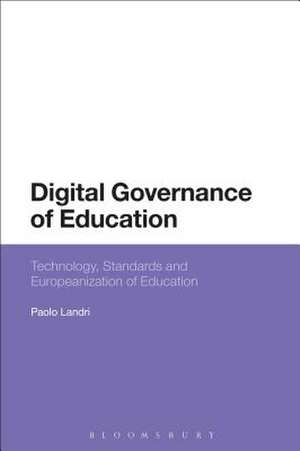Digital Governance of Education: Technology, Standards and Europeanization of Education
Autor Paolo Landrien Limba Engleză Hardback – 19 sep 2018
| Toate formatele și edițiile | Preț | Express |
|---|---|---|
| Paperback (1) | 222.66 lei 6-8 săpt. | |
| Bloomsbury Publishing – 18 mar 2020 | 222.66 lei 6-8 săpt. | |
| Hardback (1) | 772.33 lei 6-8 săpt. | |
| Bloomsbury Publishing – 19 sep 2018 | 772.33 lei 6-8 săpt. |
Preț: 772.33 lei
Preț vechi: 1112.08 lei
-31% Nou
Puncte Express: 1158
Preț estimativ în valută:
147.79€ • 158.03$ • 123.22£
147.79€ • 158.03$ • 123.22£
Carte tipărită la comandă
Livrare economică 17 aprilie-01 mai
Preluare comenzi: 021 569.72.76
Specificații
ISBN-13: 9781350006430
ISBN-10: 1350006432
Pagini: 192
Dimensiuni: 156 x 234 mm
Greutate: 0.44 kg
Editura: Bloomsbury Publishing
Colecția Bloomsbury Academic
Locul publicării:London, United Kingdom
ISBN-10: 1350006432
Pagini: 192
Dimensiuni: 156 x 234 mm
Greutate: 0.44 kg
Editura: Bloomsbury Publishing
Colecția Bloomsbury Academic
Locul publicării:London, United Kingdom
Caracteristici
Investigates the risks and the possibilities of digitization of education in Italy, to explore the wider international implications of this global trend
Notă biografică
Paolo Landri is Senior Researcher in the Institute of Research on Population and Social Policies at the National Research Council (IRPPS-CNR), Italy.
Cuprins
1. Digital Governance, Standardization of Education and Transparency2. Tracing the Sociomateriality of the Digital Governance of Education3. The Visualization of the European Space of Education4. Houses of Glass? The Fabrication of a School Data Infrastructure5. The Use of School Data Infrastructures: 'Secrets Algorithms' and the Data-Based 6. Becoming Topological. The Development of the Digital Schooling7. Conclusion: 'Cartographies' as Critical ToolsNotesReferencesIndex
Recenzii
Provides an up-close analysis of how digital technologies are reshaping education systems and schools across Europe and beyond. Through theoretically grounded and methodologically adventurous case studies, Paolo Landri provides the necessary critical cartography for future studies at an important new front in sociology of education.
Digital technologies are changing the worlds of education and their forms of governance and this timely book proposes a critical understanding of the digital governance of education. At the end of the journey, readers will be able to view the digital-era governance through different eyes and feel urged to give a different sense to their own experience of it.
Digital technologies are changing the worlds of education and their forms of governance and this timely book proposes a critical understanding of the digital governance of education. At the end of the journey, readers will be able to view the digital-era governance through different eyes and feel urged to give a different sense to their own experience of it.
